#i could write whole essays on her names but i'll spare you the details
Text
Everything New
This is my entry for Day Four of the OC New Year's Challenge!
I stretched today's prompt a little to allow me to introduce one of my dozens of new, fletchling, unintroduced OCs. So, without further ado, meet...
María de los Angeles de León y Hirata, better known by her flamenco alias, Reina de Urado

Reina is the daughter of a Japanese woman and a certain Spanish navy officer who would try to execute one Stede Bonnet years later. Her father was ashamed of his bastard daughter, and only returned to Japan after lots of begging from her mother. Once he was there, he had the little girl baptised under a Christian name - something that he must have thought was an act of grace but was actually a curse under Japan's current government. But the officer didn't care, and promptly left.
Ignoring the baptism, Reina grew up as, well, Reina, meaning under her Japanese name, but she soon grew restless and curious of her Spanish heritage. So, she set out to see with a small pirate crew and, after many adventures, landed in Andalusia, where she was welcomed among the Romani population and learned, above all, their song and dance, but also continued her studies of plants, her fascination belonging to the poisonous ones.
But her freedom wouldn't last as her Spanish father was left without an heir, and decided to legitimize his bastard daughter, forcing "María" to become a "proper lady" under his constant watch. One day, having learned of her seafaring past, he wanted to demonstrate to her the the punishment for piracy, and the "Gentleman Pirate" was his victim.
But things don't go as planned and Reina uses the chaos to escape, returning to the seas once more. Only that this crew isn't half of what she expected.
▄▄▄▄▄▄▄▄▄✼▄▄▄▄▄▄▄▄▄▄
Taglist: @starcrossedjedis @oneirataxia-girl @daughter-of-melpomene - let me know if you’d like to be added or removed!
#our flag means death#ofmd#ofmd oc#oc: reina de urado#i could write whole essays on her names but i'll spare you the details#also flamenco wasn't really a thing at the time of ofmd i think#but neither was la vie en rose so i don't care#i want her to dance flamenco#moodboard#playlist#onyc23#Spotify
4 notes
·
View notes
Text
In defense of Andrew Graves: Facing Yourself
Alt title: Andrew Graves: The Will to Plow Her
I think my analysis of Andrew is one of the best essays I've written so far. But since then, I think I've expanded my understanding of his character in a way that urges me to add on to my prior essay. What I intend on doing is further fleshing out my reading of Burial, and going deeper in detail on why I think Decay ends up panning out the way it does. This essay will end up sharing a lot of text with my prior one, but will add enough scattered throughout that I think it merits a complete reread instead of just scrolling down and seeing what's new.
I've focused a lot on Ashley in my past writings. She's my favorite character in the story (and depending on how episode 3 pans out, maybe ever) and I'm pretty mortified by how some parts of the fandom have reacted towards her, so I pretty much made it my life's mission to push back against that. From highlighting the ways Andrew mistreats her, to coming up with justifications for her behavior that aren't just being a manipulative bitch, I really wanted to prove that a more favorable picture of her could be painted than most were willing to.
But in doing so, I've left Andrew in the dust.
In highlighting his flaws and the ways he mistreats Ashley, I think I've implied a level of intentionality to his actions that I don't believe he has. When I say that Ashley did nothing wrong, it's in direct response to the idea that she holds the most responsibility and agency in how their dynamic plays out, when in reality, I believe she has very little. Most of her actions in-story are in reaction to a variety of stimuli that come directly from Andrew, that he has control over and are aware of how Ashley feels about. His refusal to use clear and direct language to deny her most toxic tendencies causes her more and more stress as time goes on, and instead of giving her clear answers he opts to be catty, passive-aggressive, or, at his worst, threatening. Never direct and never clear, except when establishing boundaries over his name after the choking scene. Andrew fails to help Ashley be better in some frankly depressing ways throughout the whole story, especially in their childhoods, so we never get to see where she'd fall short if given a better influence.
...
Kind of. More on that later!
In mentioning his thing about preferring to be called Andrew instead of Andy, I also implicitly mention one of the places where Ashley falls short in their dynamic and could stand to do better: recognition.
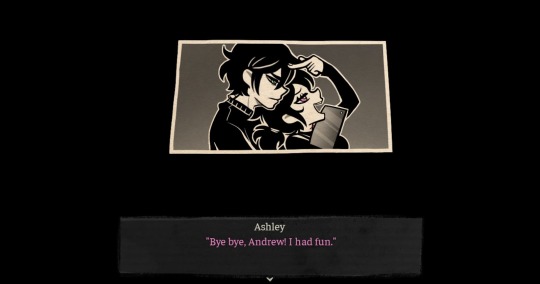
This scene says a lot. It's the most heartbreaking scene in the game, if you ask me, and probably the single most profound and well-written moment in the entire story. I could write a whole 2000 word essay on it alone, but I've already said most of what I have to say about it through what I've said in other essays, so I'll spare you all that. Instead, I'll use it to highlight something:
"I had fun."
Their dysfunction is fun to her. She's so used to abuse and alienation that even the most awful, stressful (as far as we know) route of the game is still fun to her. And that's not a sign of her being a secret evil sociopath or whatever; that's actually not abnormal behavior to develop for a lifelong victim of abuse. Those highs and lows, those strong emotional highs and lows are -addicting-. They're -fun.- Part of why abuse victims get into so many abusive relationships is because it's easy to pick up on those patterns of thought and take advantage of them, and the cycle of abuse is often furthered when a victim of abuse tries to draw out mutually abusive behaviors in someone with no interest in having that kind of dynamic.
This is where I'm willing to acknowledge Ashley's manipulative tendencies. Not just as a matter of controlling Andrew for its own sake, purely out of jealousy or possessiveness, but as a matter of trying to further the only dynamic she's ever known in her life. Better the devil you know, right?
That push and pull- that emotional rollercoaster- is all many of us know. And it's all Ashley knows. This dynamic is something she's so used to that she reacts incredibly harshly to any attempt to change it, because she doesn't know that things can be better. Because of this, she refuses to engage with who Andrew really is, and tells herself- and him- that she *hates* Andrew:
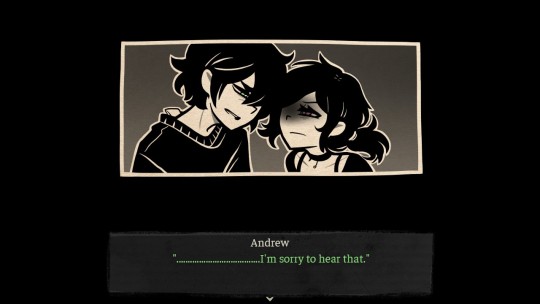
This scene is almost as heartbreaking as the above one in a lot of ways.
Andrew putting his foot down about the Andy/Andrew name dichotomy wasn't arbitrary and it wasn't just about his comfort. It was about Andrew giving a clear indication about what needs to happen for their relationship to improve. He's recognizing the cycle between them and wants to put a stop to it, because he's confident that things between them CAN get better and evolve into something healthier. Ashley, not understanding that their dynamic can get better, because their "fun" little push and pull of abuse is all she knows, rejects that. She rejects the unknown, and says- in Andrew's mind at least- that she'll never accept that new dynamic, nor will she accept who he really is.
Ouch. No wonder he looks so sad in that screenshot.
They have a conflict of understanding here, and I think it's fair to pin most of the responsibility on Ashley. Andrew was clear in what he wanted, and Ashley just... Didn't. She didn't see the importance of it ("...whatever that means in practice") and didn't really ask. This gap in communication, perfectly displayed in this scene, is likely what causes the Decay ending. He wants things to be better, and wants to treat Ashley better, and whether or not he understands the ways in which she communicates with him is in part what determines what he sees her as.
But there's a lot of evidence that he always wanted things to be better, that he always wanted to treat her better. But external factors have made it very, very difficult, and I think there are two key points in which he started to shed the importance of those external factors and seek that better relationship, both of which happening in the apartment: The killing of the warden and the 302 lady. In the first case, he was forced to do it to protect Ashley in a way he hadn't done before, or depending on how you look at it, since the death of Nina. But the intentionality was the key point here. After this point, he calls Ashley Leyley, which may or may not seem important at this point, but it's something I'll draw attention to later, so keep that in mind.
Next is the killing of the 302 lady, which is the much, much bigger point. We don't learn much about it until later on- as at first he just gives an excuse about the nail gun that doesn't line up with what we see on the map- but during the dream, it's revealed it was a calculated, intentional killing that he did to make sure there was no evidence left behind, and because Ashley (supposedly) would've wanted him to do it anyway. I say supposedly because Ashley herself doesn't seem to ever want Andrew to kill for her past Nina's death, because he only ever kills for her to defend one or both of them. If you want more evidence that violence for violence's sake isn't something she wants, look at this part in the final dream:
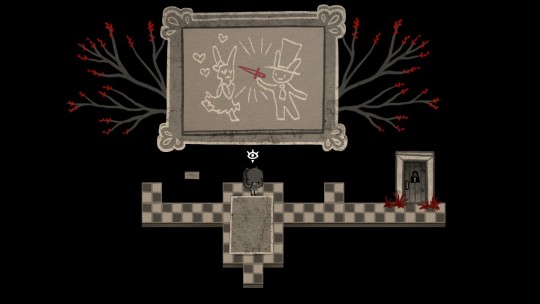
A knife isn't what opens the door, despite it being placed on the ground in that very map. While it seems obvious that the knife (violence) would be the key to solving the puzzle, it's put there explicitly to show you that it isn't. It's not what she wants; what she wants is a flower.
So, why is this important? Why am I centering Ashley- again- when this essay is supposed to be about Andrew?
It's because these two killings are when Andrew's self-delusion over who he really is starts to break down. It's still there, mind, as he still relies upon Ashley as an excuse to justify it, but, as well as what I've said before, the name ultimatum is an implicit confession that the normalcy he finds comfort in is starting to lose its grasp on him. There's a lot that's been said about Andy being something close to a "moral impulse" for Andrew, given his child self's reaction to Nina's death being the only thing he does that approximates a normal moral response to his and Ashley's actions, but if you do think that- which I think is a reasonable thing to think even if I don't necessarily agree- there's something you must also keep in mind:
-He- is the one who doesn't want to be called that anymore. -He- is the one who wants to let that moral impulse go, and Ashley is the one making it difficult.
That reading is assuming that Andy is a moral impulse, which I think is... either wrong or too simplistic. Every time I see that reading, it's from someone who's trying to paint him too sympathetically and absolve him of most moral responsibility. I also find it infantilizing to equate morality with childhood in such a way? But that's another tangent that I didn't sign up to talk about. What I do think, however, is that it's a useful framing device to display his own relationship with morality; the allegory to his child self doesn't have to be there for the general pattern to exist.
When Ashley starts to grill Andrew over the killing of the 302 lady, he gets mad. Very mad. Ashley sees it as pointless, as him covering his own ass, but he genuinely did it for her sake, because he thought that's what she wanted, and that it'd make her happy. But what makes her happy isn't violence- or any similarly extreme action for that matter- it's attention and validation. Something he's always reluctant to give her, despite the fact that he always chose her over the alternatives. But despite making that choice, it's always empty and meaningless, because in Ashley's mind, he never did it for her sake.
And hoo boy, does he not like it being framed like this.
He is perfectly willing to do whatever it takes to keep them happy and safe... but only for her sake. It has to be for her sake. He still needs that traditional role, and he still needs to have a narrative in which he's the good guy- a protector. Because it can't be for his sake. It can't be because that's what he wants. He has to uphold that romantic (in the literary tradition sense) ideal. His darkly romantic idealistic streak colors many of his actions and beliefs. This is most plainly visible in his quip about a double suicide being romantic, but it's also visible within the symbolism present within his dream, such as how he can only pave his own path in blood unless Ashley lights the way. It's visible within his appreciation for poetry, and it's visible with how the cultist within the dream speaks in Shakespearean English.
But the transient nature of this ideal is also revealed within this dream, because there's never a cohesive, guided path, even with Ashley there to light it up. Contrary to Ashley's dream, where you literally have maps showing you where to go, Andrew's dream has many more dead ends and no map to guide him. The symbolic role he acts out gives him no clarity, and there's no overarching narrative; merely a bunch of disconnected symbols.
This is contrasted with Ashley's dream, which has narratives so clear that the story literally gives the dream an episode title.
In a sense, he wants to view himself as an actor acting out a role in a story. He wants his life to be poetic, to represent something greater, and to have a cohesive narrative. This is why he's so disconnected from his true desires: He's more concerned with acting as a representative of an ideal than a person with agency. But every time the mask drops, every time he stops acting, his true self becomes visible. He naturally settles into being comfortable around Ashley, in treating her with warmth and kindness, and their banter becomes much less toxic. As intent as he is on acting out his role, it does nothing for him, and as his dream sequence shows, it doesn't even form a cohesive narrative, because he can't act one out. It's too contrary to who he really is, and what he really wants. But that idealization doesn't just apply to himself, it also applies to Ashley. Specifically, who Ashley is, vs who he wants her to be.
In his unique dream sequence, he sees two versions of Ashley; the child version of her- Leyley- and the adult version of her- Ashley. And the differences in the ways he interacts with the two of them are stunning. Leyley is an obstinate, annoying child. She's the one he NEEDS to take care of, and he hates that. He hates Leyley for what she did for his childhood. He hates that he needs to provide for her. He has the option of trying to kill her, even, over something as small as a candle!
But in the room with all the murders, the gilded cage, he sees Ashley as an adult. This version of Ashley is stuck in a closet that he himself has to open- and to choose to see. Their interactions are calm and friendly. She teases him a bit, sure, but she's still helpful, and they have fun together. He doesn't need her, and she doesn't need him. He needed Leyley- needed the candle- but here, there are other limbs strewn about for him to take. And, crucially, he doesn't even have the option to kill this Ashley for one of the limbs.
And during the choking scene, he lets her go the moment she acknowledges that he doesn't need her anymore. This is the first time we know of that he seems comfortable enough to set a clear boundary, which is acknowledging that their prior dynamic is dead and that they're now Andrew and Ashley, not Andy and Leyley. It's a bit late to express a clear boundary -after- literally acting like he was going to kill someone, but it's the first time we know of that he sets a clear standard for what, in his mind, would improve his relationship with Ashley.
After all, what he wants is to want her, not need her. He wants Ashley for Ashley's sake. Not for what she can provide him. He doesn't even need her for sleep, he just wants her. But Ashley has trouble acknowledging this, because he's never before shown that WANT. Only a NEED. She keeps trying to find ways to make him need her, because she's never seen what his desire for her is really like. She's only ever seen him desiring someone else, someone other than her.
She's only ever seen him as Andy, because she's never truly seen Andrew, only the violence he can inflict on others. But Andrew can see both:
He can see Leyley, the needy, bratty child who always needs his attention, that he needs to provide for. The one he hates and wants to get rid of. The one he kills for to protect.
And he can see Ashley, the one who engages in friendly and cute banter with him. Who comforts and shows him physical affection. The one he loves. The one he kills for to make happy.
He just can't choose which one he wants to see. Every outside influence- from his parents, to Julia, to Nina- makes him see her as Leyley. Ashley herself makes him see her as Leyley too, whenever she brings up all the things he did for her, and calls him Andy, his child self, instead of Andrew, his current self. And as long as he sees that child, he feels like one too, and can never give Ashley anything that comes from the heart.
But he really, really wants to see Ashley as an adult. He wants to take pride in her, how much she's grown, and how driven and competent she really is.

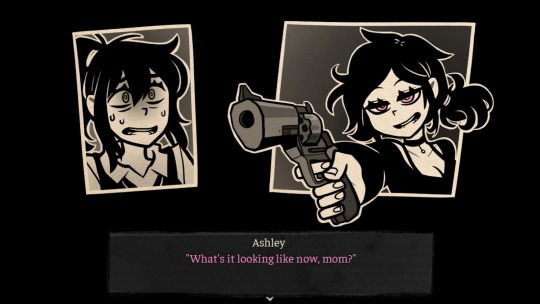
But god damn, does that bitch ever make it hard, because there IS no real difference between Ashley and Leyley. She's grown and changed over time, taking more adult (and stereotypically feminine) responsibility upon herself, but the fact that her temperament and personality hasn't changed much obfuscates that growth. When you talk to Ashley in the closet during the dream after getting the limb, Andrew asks Ashley to come out of the closet, but she refuses to come out because he won't invite Leyley over to play, which is a pretty strong metaphor for how he interfaces with different aspects of Ashley's personality and refuses to accept others. But the reality is that he needs to accept both, or rather, see her whole self as Ashley, rather than just the parts he likes.
In the end, it's him who has to make the choice how to see her. Ashley can only see what she's been shown, but Andrew can choose.
And in the basement scene, he makes that choice.
If Ashley refuses to leave him alone with their parents, that's it. In one of the most critical and important moments of his life, she couldn't give him the space needed to make up his own mind. She couldn't treat him as an adult. She couldn't see him as Andrew. If she does give him that choice, she chooses to acknowledge that Andrew is an adult who can be trusted to make his own decisions, even though she (perhaps foolishly) believes that this choice lines up with her own interests. And frankly it does either way, but in accepting their mom's offer, her chooses to see her as Leyley once and for all. He chooses not to reciprocate what Ashley showed him. He does it because he needs to, not because he wants to. Because it's his duty, not his desire.
This is what results in the Decay ending. Through his inability to see Ashley as an adult, he surrenders his agency and views all of his actions as an extension of his responsibilities, his role, which he no longer wishes to uphold. He dissociates fully from who he really is, acting in accordance with that disconnected, barely-cohesive narrative that exists only within his mind. The game starts to resemble the heartwrenching tragedy that many seem to take for granted that it is, as their dynamic fully doubles down on its painful toxicity. And, in an example of a poetic book end, Ashley's dream shows a double suicide, closing the book on their tragic tale.
It's tragic. It's heartwrenching. It's poetic. It's beautiful.
...Except it's not. Not at all.
It's actually fucking stupid, pointless, and brutal, and Burial shows us that. When we view their spiral as beautiful, we project the same darkly romantic ideal that Andrew possesses onto the story.
But the actual reality is horrifying.
Ashley spends most of Decay terrified of Andrew, the one person she found comfort in. He acts cold, distant, and aggressive towards her, showing pointless cruelty instead of any warmth. All she wants is comfort; all she wants is to not die. She doesn't want to engage in this death spiral at all, and, in her dream sequence, shows none of the same willingness to die alongside Andrew that Andrew does with her. The moment we stop focusing on the end of the Decay dream sequence, which has very striking imagery, and if you choose not to shoot, one of the most beautiful scenes in the game, we can see it for what it really is:
A scared animal running away from a predator.
The moment you see Decay through Ashley's eyes, and not the perspective of some romantic ideal, Decay becomes terrifying, tense, and painful. There is no catharsis to be had in this tragedy. It's easily avoidable as long as Andrew chooses to engage with reality, and not the empty promises of his mother and incoherent narrative of his ideal.
Finding beauty and meaning in tragedy is how we cope with the harshness of reality. But there is no coherent narrative to the tragedies we experience, just like there's no coherent narrative to the ideal Andrew wishes to uphold. It's something we create- that he creates- but it's not something that actually exists.
And when Andrew casts aside his desire for that ideal, and the responsibilities it shackles him to, it grants him clarity that he never had before. He sees the world for how it really is, and acknowledges that nobody- the least of which their mother- is as different from Ashley as they pretend to be.
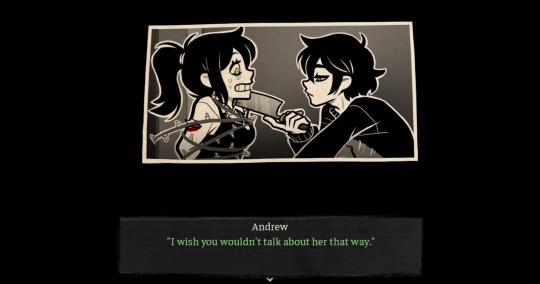
They're no better than her, and he's tired of people pretending that they are. People are all the same, no matter what ideals they try to uphold and represent. They still sacrifice others in the name of advancing themselves, still punch down whenever they can, and still lay blame on those beneath them rather than try to take control of their lives. They just use those ideals to justify themselves, but Ashley, and now Andrew, reject even the need for that justification.
This is why I believe the story is nihilistic. Not in that it asserts the inherent meaninglessness of life, but in that it grapples with the ideals we uphold and how they obfuscate the reality of the world we live in. The story, intentionally or not, highlights how ideals are often but a pretense we use to justify what we were likely going to do regardless, and how holding to them too strongly can lead to our ruin- and how monstrous they make us look to those who do not share them.
Consequently, this is how I view the part of the fanbase who thinks Decay is a good ending.
(the characters themselves represent existentialism rather than nihilism but i couldn't really fit that analysis in here without it feeling forced so i might cover that another time)
From that point on, their relationship becomes a lot more friendly, lighthearted, and playful. They ironically start acting more like children, but to quote CS Lewis:
"Critics who treat adult as a term of approval, instead of as a merely descriptive term, cannot be adult themselves. To be concerned about being grown up, to admire the grown up because it is grown up, to blush at the suspicion of being childish; these things are the marks of childhood and adolescence."
He's not ashamed of being playful with Ashley, or showing affection towards her. He's grown up. He finally sees her, and himself, as an adult- although he still doesn't show that in full until much later on (more or that later). But in Decay, he still sees her as a child, and to an extent, probably himself. Let's compare the ways in which he reacts to being called Andy. In Decay, he lashes out at Ashley and gets angry, even threatening her. But in Questionable Burial, he calmly says that Andy is dead and doesn't need Ashley's comfort, but still tries to reassure her that she's still needed. He's not ashamed of or hostile towards their prior dynamic, because he's grown past it. He still acknowledges Ashley's need to feel needed, but here, he recognizes its importance to her, whereas he was hostile towards it before.
It's a display of respect towards her feelings.
This interaction doesn't happen in the Sane ending, however. He doesn't play games with her and is just a lot less fun to be around all together. Why is that? Because he still hasn't yet shaken viewing Ashley as Leyley there. He still views her as a burden, as someone who needs taking care of. He's calmly accepted that, too, mind you, but he lacks respect for her because she's still a child, in his mind. But in Questionable?
The vision did more than just make him extremely embarrassed and lay his deepest desires bare. It forced him to recognize Ashley as an adult. When choosing between "Never" and "Never say never," if Never is chosen, the burden of thought is lifted off of him. But if Ashley chooses "Never say never!", he has to reckon with the fact that Ashley is an adult, someone who can consent to those kinds of things. Someone who MIGHT. Someone who has agency, and can make her own decisions. And more importantly… someone who can trust him to make his own.
Whether he desires sex or not is secondary; he's always had those feelings and has always been ashamed of them. But now that the part of him where that shame came from is dead and buried, there's no childish impulse to grow up. There's no attachment to the hate and bitterness he had before. Look at what he worries about when he picks up that she's uncertain or confused about who he is now:
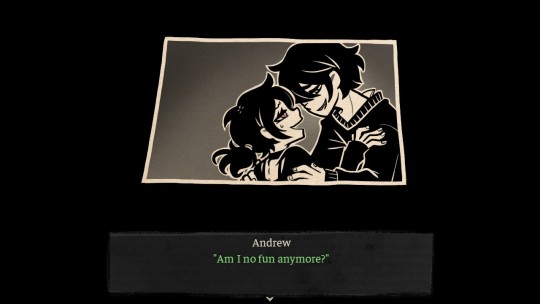
It's her feelings.
He wants to be fun to be around. He wants to make Ashley happy. He loves her, and not as a romantic interest or even as a sibling. He loves her independent of all that baggage.
He loves her as a person.
Their relationship runs contrary to societal ideals in some pretty huge ways. So contrary, in fact, that it's hard for some to accept it as anything good, that it can ever be best for the people involved. It's incestuous. It involves them killing and eating their parents. It involves them distancing themselves so much from society that it's hard to believe they'll ever fit in it again. It's chaotic, it's messy, it's codependent, and maybe even toxic. And yet, here they are. They're coexisting. They're happy. They're healing. They're navigating the world in the only way they can: together.
Meanwhile, in Decay, Andrew refuses to allow himself to get closer to Ashley. He surrenders all agency to her, buys into his own narrative, drinks his own Kool-Aid, and may or may not condemn one or both of them to death in the process. Like it or not, the only path where Andrew takes ownership of his life is the one where he's closest to his sister. It's the one where he decides where they will go next, the one where he decides his own feelings matter, and acts in accordance with what he wants instead of how he thinks he should act.
His agency, his freedom, and his growth don't happen in spite of his codependency; they're happen because of it. They can't grow alone. They can't heal alone.
In reading the story, one must interrogate how important those societal ideals are in the face of the realities of what makes people happy. Are those ideals worth upholding in spite of this? Can we really allow people to fall through the cracks in the name of social norms? Can we blame people for taking rash actions when the social contract has failed them?
Or are we so blinded by those ideals that we can't see that people can be happy while blatantly disregarding them?
All I know is that in Burial, Andrew, having cast aside normalcy, now appears to be truly happy for the first time in his life.
Who are we to take that from him?
172 notes
·
View notes